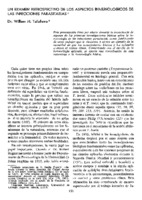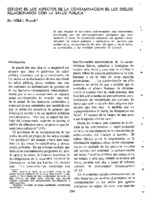Ecología del parasitismo en el hombre
Date
s.d.1971
Metadata
Show full item recordAbstract
Three closely related factors play a role in parasitic infections: the parasite, the host and the environment. To establish endemicity, certain biological and ecological conditions that act on the parasite and its host must occur in conjunction The parasites must be present in specific numbers; possess suitable pathogenicity and adaptability to the host and to the environment; produce a sufficient number of cysts, oocysts, eggs or larvae to guarantee their dissemination through the environment; and succeed in passing from one host to another There must also exist a sufficient number of susceptible hosts capable of contracting and maintaining the infection. A host species' resistance or susceptibility to the parasitic infection depends upon natural or acquired immunity factors which determine favorable or unfavorable biochemical and biophysical conditions. The host's age, state of nutrition and genetic line also play a part Most parasites have little pathogenicity and disease appears when certain favorable condition - biological, ecological, and, in particular, human - occur in conjunction. Highly virulent parasites succeed in destroying their hosts and, consequently, endanger themselves in the process. Natural selection tends to eliminate the more pathogenic species and, on the other hand, favors the survival of the less virulent types which can coexist with their hosts without causing ... (AU)
Translated title
Ecology of parasitism in man
Subject
Collections
Related items
Showing items related by title, author, creator and subject.
-
Taliaferro, William H (s.d.)The introductory remarks of this study are concerned with past accomplishments. Parasitologists during the first quarter of this century were mainly interested in systematics and life histories, and some of them, especially ...
-
Simões, Bárbara dos Santos; Machado-Coelho, George Luiz Lins; Pena, João Luiz; Freitas, Silvia Nascimento de (2015)Objetivo. Descrever as condições ambientais e o quadro de infecção parasitária dos indígenas Xukuru-Kariri residentes no município de Caldas (MG), Brasil. Métodos. Foi realizado um estudo transversal em março de 2009. Dados ...
-
Shuval, Hillel I (s.d.)To give an idea of the extent and long history of soil pollution as a public health problem, reference is made to the parasitic condition of the sick rural population, the decrease in living space and the consequent pollution ...




